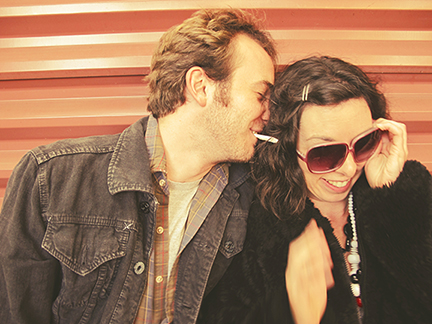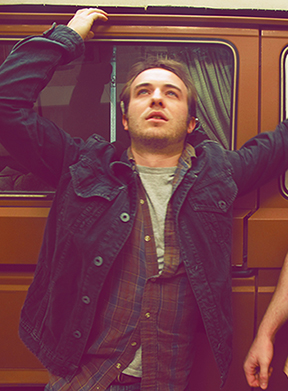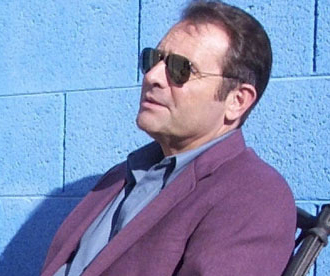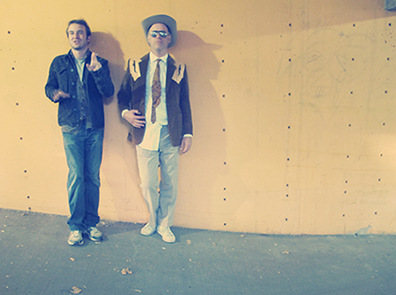Playing October 23 & 24 at The Rendezvous, the first volume of Book-It’s Circumbendibus series features a gritty new adaptation of Denis’ Johnson’s Jesus’ Son, adapted by Jeff Schwager and directed by Josh Aaseng.
Read more about Book-It’s new late-night series here.
Adapter Jeff Schwager writes about his experience with Jesus’ Son and meeting author Denis Johnson 21 years ago:

The first time I came across one of the stories that would eventually make up Denis Johnson’s collection Jesus’ Son—it was Car Crash While Hitchhiking, in the Spring 1989 issue of The Paris Review—it hit me with the force of a 16-ton semi truck. Like everyone else in those days, I was focused on the so-called minimalist school of writing, authors like Raymond Carver and Tobias Wolff, whose work focused with microscopic precision on the everyday experiences of regular people. The characters in Carver’s and Wolff’s stories might have been your next-door neighbors, your college professors, or your hard luck relatives; you knew them, and you knew about their problems. Their lives were, in some sense, clichés (as all our lives are), but the best of the so-called minimalist writers managed to get past the clichés and find clarity and honest emotion in spare dialogue and surprising images.
Car Crash While Hitchhiking was anything but minimalist, and its protagonist was certainly not your next-door neighbor—unless you happened to be living on the streets or in a communal situation that revolved around the procurement and consumption of illicit drugs. The plot of the story is right there in the title, but the magic was in the language and the point of view:
[quote]A salesman who shared his liquor and steered while sleeping… A Cherokee filled with bourbon … A VW no more than a bubble of hashish fumes, captained by a college student . . .
And a family from Marshalltown who head-onned and killed forever a man driving west out of Bethany,Missouri. . .
… I rose up sopping wet from sleeping under the pouring rain, and something less than conscious, thanks to the first three of the people I’ve already named—the salesman and the Indian and the student—all of whom had given me drugs. At the head of the entrance ramp I waited without hope of a ride. What was the point, even, of rolling up my sleeping bag when I was too wet to be let into anybody’s car? I draped it around me like a cape. The downpour raked the asphalt and gurgled in the ruts. My thoughts zoomed pitifully. The travelling salesman had fed me pills that made the linings of my veins feel scraped out. My jaw ached. I knew every raindrop by its name. I sensed everything before it happened. I knew a certain Oldsmobile would stop for me even before it slowed, and by the sweet voices of the family inside it I knew we’d have an accident in the storm.
I didn’t care. They said they’d take me all the way.[/quote]
The narrator, who isn’t given a name, has the innocence of a child and the substance of a ghost. His senses are hyper-tuned to the world around him, but he lacks any emotional connection to other people. When a woman screams, his response is completely without empathy:
[quote]What a pair of lungs! She shrieked as I imagined an eagle would shriek. It felt wonderful to be alive to hear it! I’ve gone looking for that feeling everywhere.[/quote]

In the fall of 1991, I was working as the book and theater editor of a local weekly paper in Los Angeles. The MET Theatre in Hollywood announced a reading series, and Johnson was one of the featured writers. His publisher told me he wasn’t doing any interviews, but I got in touch with the head of the theater, who convinced Johnson to talk with me. By this time, I’d read everything he’d written that I could get my hands on, including his hard-bitten first novel Angels, which Philip Roth called “a small masterpiece”; the visionary, post-apocalyptic Fiskadoro; the poetry collections The Incognito Lounge and The Veil; and his most recent novel, the bleakly funny Resuscitation of a Hanged Man. But nothing could match those stories; they were all I really wanted to talk about.
“Some of them are almost entirely autobiographical,” he told me. “Originally, I wasn’t even going to change the names. I wasn’t really planning to publish them. They were just things I was experimenting with. I was just sort of improvising, and I wasn’t revising them. Car Crash, that was pretty much written in one sitting. They were just things that happened to me. And what interested me in particular was that I had passed far beyond that phase in my life, but I was writing them in the first person, looking back, so there was a kind of duality to the voice.”

In person, he seemed low-key and a little nervous, but very pleased that the stories, which weren’t scheduled to come out in book form for another year, had moved me so deeply. Sitting in the MET Theatre’s folding chairs a few hours before the reading, we talked about the late ’60s and early ’70s, which he had lived through and I had read so much about, an era he had captured so vividly in the stories. He was the son of a diplomat, born in Munich and living in various parts of the world, including Manila and Tokyo, as well as Washington, D.C. His family had deep roots in the establishment, roots he had pulled up out of the ground to go on his own journey.
“When all this happened,” he said, “I was [studying writing] at Iowa City, and that was kind of an era for me. It seemed like the world was falling apart and the President would soon be some acid-head—one of the Grateful Dead would get elected, or else we would overthrow the government. I remember going home to Washington, D.C. after some riots, and there was barbed wire everywhere, and guys in jeeps with machine guns were patrolling the streets. It was like a war zone. It was a curious time. And for me, that’s what those stories are all about: that curious time.”
That night, Johnson read from the story Emergency, and the actor Arliss Howard read Car Crash While Hitchhiking accompanied by drums and guitar. Then the actress Holly Hunter read from Johnson’s first novel, Angels, which she hoped to get made into a movie. Unfortunately, that movie never happened, though when Jesus’ Son was filmed a decade later she played a small role. Johnson had a cameo in that movie as well, as a man with a knife in his eye.
In the years since Jesus’ Son, Johnson’s work has continued to receive great acclaim. His 2007 Vietnam novel Tree of Smoke won the National Book Award; his 2011 novella Train Dreams was one of three finalists for the Pulitzer Prize. He has also written several original plays as the resident playwright of the San Francisco theater company Campo Santo. But nothing he or anyone else has written since has struck me with the force of Jesus’ Son.

Jeff Schwager, who adapted Jesus’ Son for Book-It Repertory’s Circumbendibus series, is a Seattle-based writer and editor.
Links:
New York Times review of Jesus’ Son
http://www.nytimes.com/1992/12/27/books/1992johnson-jesus.html
Denis Johnson reads from Jesus’ Son
http://www.frontporchjournal.com/issue20_video_johnson.asp